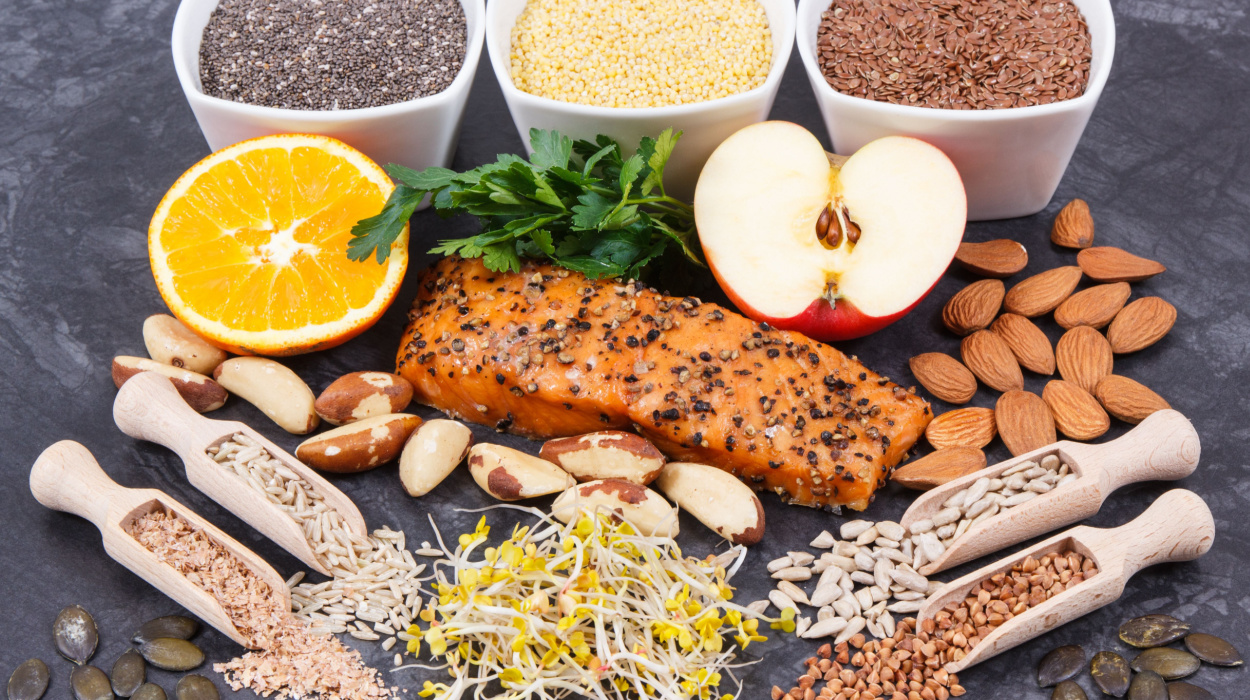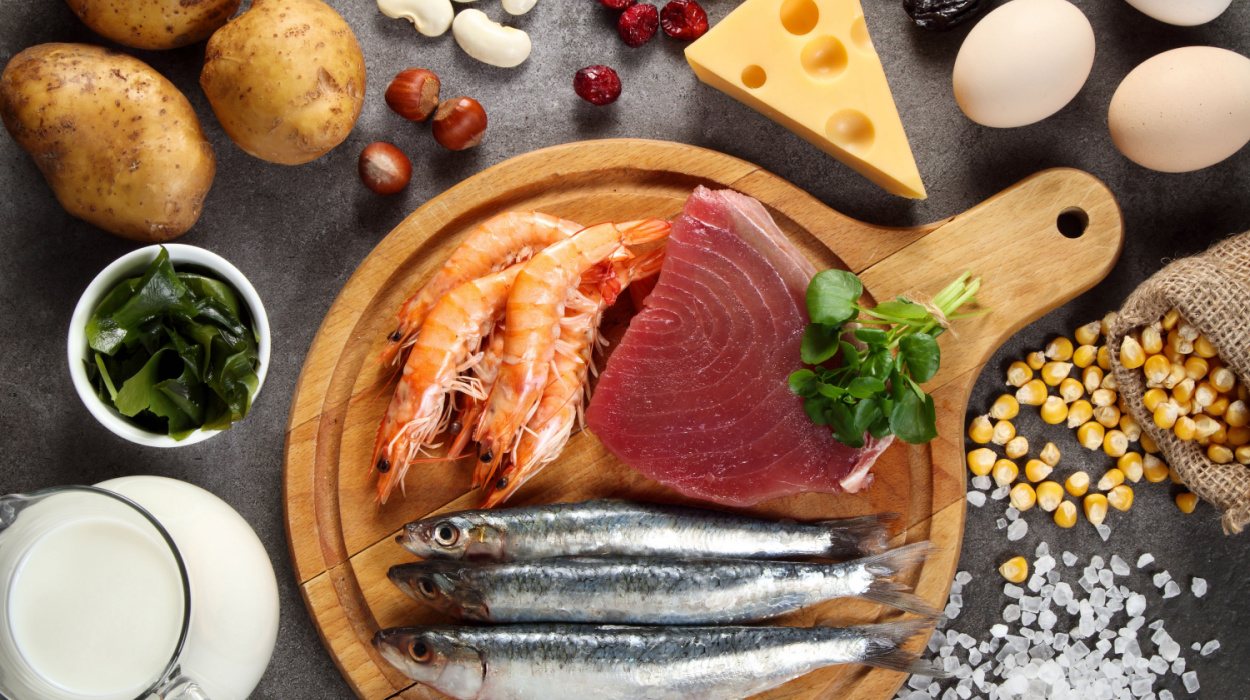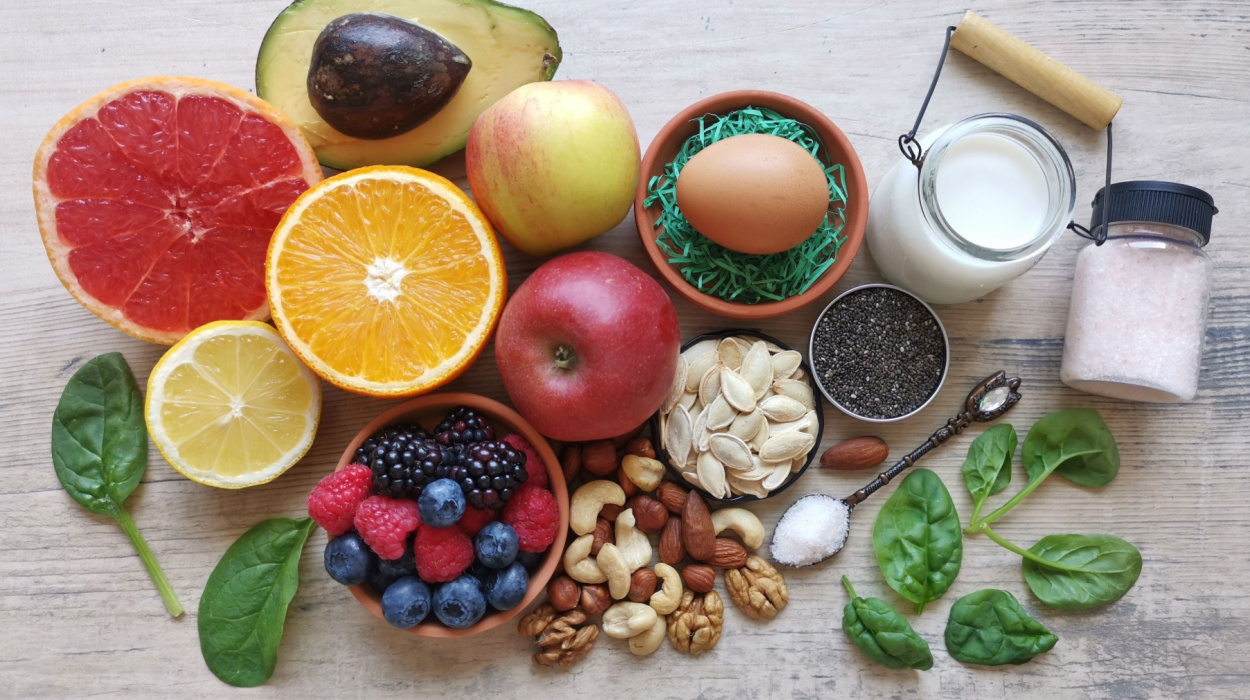 Expert's opinion
Expert's opinion
Expert's opinion
The article is a subjective view on this topic written by writers specializing in medical writing.
It may reflect on a personal journey surrounding struggles with an illness or medical condition, involve product comparisons, diet considerations, or other health-related opinions.
Although the view is entirely that of the writer, it is based on academic experiences and scientific research they have conducted; it is fact-checked by a team of degreed medical experts, and validated by sources attached to the article.
The numbers in parenthesis (1,2,3) will take you to clickable links to related scientific papers.
Hypothyroidism Diet: Find Out The Best Diet For Hypothyroidism In 2024

Hypothyroidism is one of the most common thyroid conditions, resulting in hormonal imbalances and a slew of symptoms. Fortunately, it can be managed with a special diet, supplements, and other healthy lifestyle changes.
A hypothyroidism diet focuses on specific foods to eat and avoid to help you feel your best and balance your hormones. Following this healthy diet makes you more aware of what you eat and what the food around you consists of.
In this article, you’ll learn what foods to avoid with hypothyroidism, what foods to include more of, and why. We’ll also review the supplements you may need to take to further support your thyroid function.
Diet For Hypothyroidism: Balancing Meal Plan For Thyroid Health
- Breakfast: Thyroid-Boosting Smoothie
- Lunch: Quinoa and Vegetable Salad
- Dinner: Baked Salmon with Roasted Asparagus
Hypothyroidism Diet: A Meal Plan For People With Thyroid Disease
The hypothyroidism diet focuses on providing optimal nutrition to support thyroid function. This meal plan is designed to include foods that are rich in iodine, selenium, and antioxidants that are beneficial for individuals with hypothyroidism. These meals aim to boost metabolism and energy levels while managing thyroid-related symptoms.
This hypothyroidism diet meal plan provides a balanced intake of essential nutrients to support thyroid health. It’s designed to help individuals manage their condition and improve overall well-being.
Breakfast: Thyroid-Boosting Smoothie (Approx. 270 Calories)
Energize your day and support your thyroid health with a thyroid-boosting smoothie, a breakfast delight carefully tailored to align with your hypothyroidism diet. This smoothie nourishes your thyroid, and savor a fusion of flavors and nutrients that’ll set a positive tone for your morning.
| Breakfast | |
| Greek yogurt | Half a cup |
| Raw spinach | One cup |
| Blueberries | Half a cup |
| Banana | Half a fruit |
| Chia seeds | One tablespoon |
| Honey (optional) | One tablespoon |
Lunch: Quinoa And Vegetable Salad (Approx. 430-500 Calories)
Elevate your midday meal with quinoa and vegetable salad, a delicious and thyroid-friendly dish that aligns perfectly with your hypothyroidism diet. This salad is a symphony of flavors and textures, designed not only to satisfy your flavors but also to nurture your thyroid health.
| Lunch | |
| Cooked quinoa | One cup |
| Grilled chicken breast | Three ounces |
| Mixed Vegetables | One cup |
| Olive oil and lemon juice dressing | Two tablespoons |
| Fresh parsley | One tablespoon |
Dinner: Baked Salmon With Roasted Asparagus (Approx. 325-380 Calories)
Experience a delightful and thyroid-friendly dinner with baked salmon with roasted asparagus. This is a flavorful and thyroid-nourishing choice that combines the goodness of salmon and vegetables to enhance your hypothyroidism diet while savoring every bite.
| Dinner | |
| Salmon fillet | One cup |
| Asparagus spears | Three ounces |
| Olive oil | One tablespoon |
| Lemon zest and juice | One fruit |
| Fresh dill | One tablespoon |
What Is Hypothyroidism?
Hypothyroidism is a thyroid condition that occurs when your thyroid can’t produce adequate amounts of thyroid hormones. This results in an underactive thyroid that slows down your entire metabolism.
The thyroid is a butterfly-shaped gland located at the base of your neck. It plays a variety of important roles[1] in many of your body’s functions. From regulating your metabolism and body temperature to muscle growth and even fetal development, the thyroid is involved in almost every process.
It produces the essential thyroid important hormones, triiodothyronine (T3) and thyroxine (T4). When the production and levels of these hormones go out of range and become too high or too low, it can lead to unpleasant side effects.
The most common symptoms of hypothyroidism include:
- Fatigue
- Tiredness
- Weight gain
- Digestive problems
- Delayed nutrient absorption
- Low body temperature
- Anemia
- Dry skin and hair
- Low libido
- Menstrual cycle problems
- Brain fog
If left untreated, hypothyroidism can potentially lead to more serious conditions like infertility[2], heart failure, and even stroke.
The most common causes of hypothyroidism include:
- Thyroiditis
- Hashimoto’s thyroiditis
- Radiation and surgical treatments for other thyroid conditions
- Hyperthyroidism[3]
- Iodine deficiency
- Hereditary conditions
Inflammation of the thyroid gland itself is mostly a result of chronic stress and inflammation, poor diet, and lifestyle choices, as well as other health conditions that might take the thyroid into overload.
By making necessary changes in your diet and lifestyle, you can help alleviate some of the most unpleasant symptoms and help assist with the healing treatment.
What Is The Best Diet For Hypothyroidism?
Plenty of research and a variety of studies[4] have shown how certain dietary changes can have a tremendous benefit in people with hypothyroidism. Specifically, these diet changes may help improve the function of the thyroid gland, support a healthy weight, and relieve symptoms.
The best diet for hypothyroidism includes not only foods you should eat but also those you should avoid. These foods should be limited or avoided as they can aggravate the symptoms of an underactive thyroid hormone and contribute to inflammation.
Foods To Eat
The goal of a hypothyroid diet is to lower inflammation in your body, decrease the stress response, and improve the function of your thyroid gland. The foods you should be eating should be highly nutritious and contain specific nutrients known to support thyroid health.
Foods Rich In Iodine

One of the leading causes of hypothyroidism is iodine deficiency[5], therefore your food menu should include ingredients high in iodine.
Iodine is an important trace mineral that’s essential for the optimal function of your thyroid, but it’s also easy to go overboard. Overdoing it can be harmful[6] in the long run, so always consult your doctor before increasing iodine in your diet or taking an iodine supplement.
You can get iodine by taking iodinated salts, algae like spirulina and kelp, as well as through iodine supplements.
Foods Rich In Selenium
Another important mineral[7] that’s essential for the proper function of your thyroid gland is selenium. It helps protect the thyroid from oxidative stress damage and is needed in the production of thyroid hormones.
Foods that contain high levels of selenium include Brazil nuts, eggs, tuna, sardines, and legumes. Additionally, you can increase your selenium intake through selenium supplements, as they’ve been found to be helpful in treating[8] Hashimoto’s thyroiditis.
Foods Rich In Zinc
Zinc is another important mineral that’s essential[9] to proper thyroid function, as it assists in the production of thyroid hormones. Foods rich in zinc include oysters, poultry, red meat, crab, lobster, beans, and nuts.
Foods And Supplements Rich In Vitamin D
Vitamin D deficiency[10] is one of the most prevalent micronutrient deficiencies in the world. It causes a variety of health conditions related to impaired immunity, depression, and anxiety. f Studies also show it can have a negative effect on those dealing with hypothyroidism.
Since not many foods contain vitamin D and even those that do have very small amounts, supplementation[11] is usually the necessary route. This is especially the case in the winter months when sun exposure is low. Still, some of the foods containing vitamin D include cod liver oil, mackerel, salmon, mushrooms, and fortified foods like cereal and dairy.
List Of Foods
Other than these important micronutrients, those with hypothyroidism are usually encouraged to eat foods rich in fiber that can help improve their digestion and help them manage their weight. That being said, it’s important not to go overboard as it might have some adverse effects[12].
Some of the best foods you can add to your hypothyroidism diet plan include:
- Low-sugar fruits like berries, apples, stone fruits, and citrus fruits
- Starchy vegetables like potatoes, sweet potatoes, pumpkin, and butternut squash
- Non-starchy vegetables like leafy greens, artichokes, zucchini, and spinach
- Beans like red beans, kidney beans, and black beans
- Legumes like chickpeas, peas, and lentils
- Animal protein like fish, red meat, poultry, eggs, crab, shellfish, and lobster
- Healthy fats like avocado, nuts, seeds, olive oil, and coconut oil
- Dairy and non-dairy substitutes like almond milk, coconut milk, and cashew milk
- Gluten-free grains like millet, quinoa, rice, buckwheat, and gluten-free oats
Foods To Avoid With Hypothyroidism
On the other hand, there are specific foods that should be avoided when diagnosed with hypothyroidism. Whether you’ve started a hypothyroidism diet plan for weight loss or to deal with other unpleasant symptoms, the foods on this list are known to contribute to inflammation and make the symptoms worse over time.
Gluten-Containing Grains
Gluten can worsen symptoms for those with thyroid conditions of any sort. This protein found in wheat, barley, rye, and a variety of processed foods can have a pro-inflammatory[13] effect on your body, causing an even bigger attack on your thyroid and impairing its function.
It’s usually the first recommended food to avoid for those with Hashimoto’s thyroiditis, and simply eliminating it from your diet can have a beneficial impact.
Not everyone who has hypothyroidism needs to be on a gluten-free diet necessarily. However, in the majority of cases, doctors and nutritionists recommend avoiding gluten-containing grains and foods to prevent further inflammation.
Additionally, most processed foods contain added gluten as it acts as a binder and thickener. Processed foods[14] in general are considered to be pro-inflammatory, so adding gluten into the mix may aggravate your symptoms even more.
Cruciferous Plants
Also known as goitrogens, cruciferous plants such as cabbage, broccoli, cauliflower, kale, and Brussels sprouts are generally advised to stay away from when you’re on your hypothyroidism healing journey. While these foods are nutritious, they can impact[15] your thyroid function and inhibit the production of thyroid hormones, the complete opposite of what you’re looking for when treating the symptoms of an underactive thyroid.
It’s important to keep in mind you may not need to completely avoid these cruciferous plants and other goitrogens like soy. For example, if these foods are cooked, goitrogenic activity[16] decreases to a level that may be safer to consume.
Sugar And Certain Fruits
Refined and even unrefined sugars are one of the greatest causes of inflammation overall. When pairing these sugars with an already weakened and inflamed immune system, adding them to your diet will only make things worse[17].
That’s why it’s generally recommended to avoid foods with a high sugar content as well as high-glycemic fruits like bananas, mango, and pineapple, since they may trigger inflammation and worsen your symptoms.
Dairy
Plenty of people with hypothyroidism are also lactose intolerant[18], so staying away from dairy and processed foods containing dairy may further support thyroid health. Dairy intake is highly individualized to the person, however.
Some people may tolerate it perfectly and it may even help alleviate some of their unpleasant symptoms as it’s high in zinc, calcium, and other important nutrients they might be lacking. For others, it may worsen digestive issues and inflammation.
Lectin-Rich Foods
Lectins are naturally-occurring proteins that bind to carbohydrates and they are known to cause inflammation and even leaky gut[19] in some people, triggering Hashimoto’s autoimmune disease and further issues with thyroid function. That’s why it’s usually avoided when on the hypothyroidism diet plan. Some of the lectin-rich foods you should avoid include most raw legumes and wheat.
Nightshades
Last, but not least, nightshades like eggplants, tomatoes, and bell peppers are a group of vegetables that might have an adverse effect on people with hypothyroidism. They are known to trigger inflammation and potentially make your symptoms worse, especially if paired with other foods that should be avoided. They are always encouraged to abstain from when starting any anti-inflammatory diet like the Autoimmune Protocol Diet[20].
Important Nutrients

Some of the most important nutrients for those with hypothyroidism include the aforementioned iodine, selenium, zinc, and vitamin D. Additionally, there are some other important nutrients worth mentioning. These include:
- Vitamin B12 – people with hypothyroidism are often deficient[21] in vitamin B12; even more so if they are following a vegan diet. This important vitamin plays a crucial role[22] in cell metabolism and thyroid function.
- Iron – low levels of iron can cause problems[23] with your thyroid, but it can also be a symptom or cause of other thyroid conditions. It’s therefore important to get to the root cause before starting supplementation or supplying yourself with iron-rich foods.
- Magnesium – low levels of magnesium are also often linked to hypothyroidism. Supplementing has shown great results[24] in improving hypothyroid symptoms.
Summary
Hypothyroidism is a condition that occurs when your thyroid cannot perform its usual functions. Your body doesn’t produce enough of its main thyroid hormones, T3 and T4, which negatively affect thyroid function, your overall health, and well-being.
Whether you’re trying to implement a hypothyroidism diet plan to lose weight, feel less tired, or deal with all of the unpleasant symptoms, consult your doctor and start your healing journey.
+ 24 sources
Health Canal avoids using tertiary references. We have strict sourcing guidelines and rely on peer-reviewed studies, academic researches from medical associations and institutions. To ensure the accuracy of articles in Health Canal, you can read more about the editorial process here
- Armstrong, M., Edinen Asuka and Fingeret, A. (2022). Physiology, Thyroid Function. [online] Nih.gov. Available at: https://www.ncbi.nlm.nih.gov/books/NBK537039/
- Dunn, D. and Turner, C. (2016). Hypothyroidism in Women. Nursing for Women’s Health, [online] 20(1), pp.93–98. doi:10.1016/j.nwh.2015.12.002.
- Hyperthyroidism (Overactive Thyroid) (2022).. [online] National Institute of Diabetes and Digestive and Kidney Diseases. Available at: https://www.niddk.nih.gov/health-information/endocrine-diseases/hyperthyroidism
- Danailova, Y., Velikova, T., Nikolaev, G., Mitova, Z., Shinkov, A., Gagov, H. and Konakchieva, R. (2022). Nutritional Management of Thyroiditis of Hashimoto. International Journal of Molecular Sciences, [online] 23(9), p.5144. doi:10.3390/ijms23095144.
- Patil, N., Rehman, A. and Ishwarlal Jialal (2022). Hypothyroidism. [online] Nih.gov. Available at: https://www.ncbi.nlm.nih.gov/books/NBK519536/
- Koukkou, E.G., Roupas, N.D. and Markou, K.B. (2017). Effect of excess iodine intake on thyroid on human health. Minerva Medica, [online] 108(2). doi:10.23736/s0026-4806.17.04923-0.
- Gorini, F., Sabatino, L., Pingitore, A. and Vassalle, C. (2021). Selenium: An Element of Life Essential for Thyroid Function. Molecules, [online] 26(23), p.7084. doi:10.3390/molecules26237084.
- Santos, L., Neves, C., Melo, M. and Soares, P. (2018). Selenium and Selenoproteins in Immune Mediated Thyroid Disorders. Diagnostics, [online] 8(4), p.70. doi:10.3390/diagnostics8040070.
- Severo, J.S., Morais, J.B.S., de Freitas, T.E.C., Andrade, A.L.P., Feitosa, M.M., Fontenelle, L.C., de Oliveira, A.R.S., Cruz, K.J.C. and do Nascimento Marreiro, D. (2019). The Role of Zinc in Thyroid Hormones Metabolism. International Journal for Vitamin and Nutrition Research, [online] 89(1-2), pp.80–88. doi:10.1024/0300-9831/a000262.
- Omeed Sizar, Khare, S., Goyal, A. and Givler, A. (2022). Vitamin D Deficiency. [online] Nih.gov. Available at: https://www.ncbi.nlm.nih.gov/books/NBK532266/
- Aktaş, H. (2019). Vitamin B12 and Vitamin D Levels in Patients with Autoimmune Hypothyroidism and Their Correlation with Anti-Thyroid Peroxidase Antibodies. Medical Principles and Practice, [online] 29(4), pp.364–370. doi:10.1159/000505094.
- Liel, Y., Harman-Boehm, I. and Shany, S. (1996). Evidence for a clinically important adverse effect of fiber-enriched diet on the bioavailability of levothyroxine in adult hypothyroid patients. The Journal of Clinical Endocrinology & Metabolism, [online] 81(2), pp.857–859. doi:10.1210/jcem.81.2.8636317.
- Krysiak, R., Szkróbka, W. and Okopień, B. (2018). The Effect of Gluten-Free Diet on Thyroid Autoimmunity in Drug-Naïve Women with Hashimoto’s Thyroiditis: A Pilot Study. Experimental and Clinical Endocrinology & Diabetes, [online] 127(07), pp.417–422. doi:10.1055/a-0653-7108.
- Myles, I.A. (2014). Fast food fever: reviewing the impacts of the Western diet on immunity. Nutrition Journal, [online] 13(1). doi:10.1186/1475-2891-13-61.
- Babiker, A., Alawi, A., Atawi, M. and Alwan, I. (2020). The role of micronutrients in thyroid dysfunction. Sudanese Journal of Paediatrics, [online] pp.13–19. doi:10.24911/sjp.106-1587138942.
- Felker, P., Bunch, R. and Leung, A.M. (2016). Concentrations of thiocyanate and goitrin in human plasma, their precursor concentrations in brassica vegetables, and associated potential risk for hypothyroidism. Nutrition Reviews, [online] 74(4), pp.248–258. doi:10.1093/nutrit/nuv110.
- Gierach (2012). Hashimoto’s thyroiditis and carbohydrate metabolism disorders in patients hospitalised in the Department of Endocrinology and Diabetology of Ludwik Rydygier Collegium Medicum in Bydgoszcz between 2001 and 2010. Endokrynologia Polska, [online] 63(1). Available at: https://pubmed.ncbi.nlm.nih.gov/22378092/
- Asik, M., Gunes, F., Binnetoglu, E., Eroglu, M., Bozkurt, N., Sen, H., Akbal, E., Bakar, C., Beyazit, Y. and Ukinc, K. (2013). Decrease in TSH levels after lactose restriction in Hashimoto’s thyroiditis patients with lactose intolerance. Endocrine, [online] 46(2), pp.279–284. doi:10.1007/s12020-013-0065-1.
- Riis, A.L.D., Hansen, T.K., Thiel, S., Gravholt, C.H., Gjedde, S., Gormsen, L.C., Jørgensen, J.O.L., Weeke, J. and Møller, N. (2005). Thyroid hormone increases mannan-binding lectin levels. European Journal of Endocrinology, [online] 153(5), pp.643–649. doi:10.1530/eje.1.02013.
- Abbott, R.D., Sadowski, A. and Alt, A.G. (2019). Efficacy of the Autoimmune Protocol Diet as Part of a Multi-disciplinary, Supported Lifestyle Intervention for Hashimoto’s Thyroiditis. Cureus. [online] doi:10.7759/cureus.4556.
- Jabbar (2013). Vitamin B12 deficiency common in primary hypothyroidism. JPMA. The Journal of the Pakistan Medical Association, [online] 58(5). Available at: https://pubmed.ncbi.nlm.nih.gov/18655403/
- Botlagunta, M. (2016). Nutraceuticals-loaded chitosan nanoparticles for chemoprevention and cancer fatigue. Nutraceuticals, [online] pp.783–839. doi:10.1016/b978-0-12-804305-9.00020-8.
- Luo, J., Wang, X., Yuan, L. and Guo, L. (2021). Iron Deficiency, a Risk Factor of Thyroid Disorders in Reproductive-Age and Pregnant Women: A Systematic Review and Meta-Analysis. Frontiers in Endocrinology, [online] 12. doi:10.3389/fendo.2021.629831.
- Rabbani, E., Golgiri, F., Janani, L., Moradi, N., Fallah, S., Abiri, B. and Vafa, M. (2021). Randomized Study of the Effects of Zinc, Vitamin A, and Magnesium Co-supplementation on Thyroid Function, Oxidative Stress, and hs-CRP in Patients with Hypothyroidism. Biological Trace Element Research, [online] 199(11), pp.4074–4083. doi:10.1007/s12011-020-02548-3.



